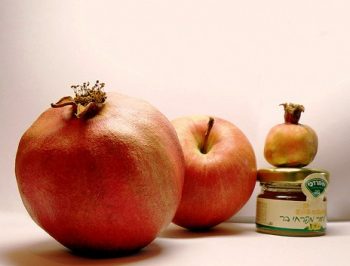Jewish New Year Food Posted by Ayana on Sep 3, 2018 in Uncategorized
Rosh Hashanah (רֹאשׁ הַשָּׁנָה) is the Jewish New Year (its name means “head of the year”).
As with any Jewish holiday, Rosh Hashanah is celebrated according to the Jewish calendar (this year on September 9th) and is full of traditional food. מַאֲכְלֵי רֹאשׁ הַשָּׁנָה (Rosh Hashanah foods) are all symbolic. They are called סׅימָנׅים (si-ma-nim, meaning “symbols”), because each symbolizes a wish or a blessing for the coming new year.
The holiday dinner (אֲרוּחַת הַחַג), although varying from house to house, is always festive. Every ethnic group has its own customs. Many Sephardic Jewish families hold Rosh Hashanah Seder (סֵדֶר רֹאשׁ הַשָּׁנָה), where a series of סׅימָנׅים is eaten due to pun derived from Rosh Hashanah blessings. Jewish scholars started this custom two thousand years ago, as appeared in the Babylonian Talmud. Preceding the dinner, sitting next to a table full of tasty colorful dishes, they recited a list of prayers for the coming new year. Every blessing was followed by eating a specific food.
Since it’s only a custom, every family can add its own blessing, and serve different סׅימָנׅים, but the most common blessings are the following nine:
We eat date (תָּמָר), for the blessing:
יְהִי רָצוֹן מִלְפָנֶיךָ ה’ אֱלוֹהֵנוּ וֵאלוהֵי אֲבוֹתֵינוּ, שֶיִתַמוּ אוֹיְבֵינוּ וְשוֹנְאֵינוּ וְכָל מְבַקְשֵי רָעָתֵנוּ.
We eat pomegranate (רִמּוֹן), for the blessing:
יְהִי רָצוֹן מִלְפָנֶיךָ ה’ אֱלוֹהֵנוּ וֵאלוֹהֵי אֲבוֹתֵינוּ, שֶנִהְיֶה מְלֵאִים מִצְוֹת כָרִמוֹן.
We eat pumpkin (in modern Hebrew דְּלַעַת, in Aramaic קָרָא), for the blessing:
יְהִי רָצוֹן מִלְפָנֶיךָ ה’ אֱלוֹהֵנוּ וֵאלוהֵי אֲבוֹתֵינוּ, שֶתִקְרַע רֹעַ גְזַר-דִינֵנוּ, וְיִקָרְאוּ לְפָנֶיךָ זְכֻיוֹתֵינוּ.
We eat pods bean (רוּבְּיָא), for the blessing:
יְהִי רָצוֹן מִלְפָנֶיךָ ה’ אֱלוֹהֵנוּ וֵאלוהֵי אֲבוֹתֵינוּ, שֶיִרְבּוּ זְכֻיוֹתֵינוּ וּתְלַבְּבֵנוּ.
We eat leek (in modern Hebrew כְּרֵישָׁה, in Aramaic כָּרָתֵי), for the blessing:
יְהִי רָצוֹן מִלְפָנֶיךָ ה’ אֱלוֹהֵנוּ וֵאלוהֵי אֲבוֹתֵינוּ, שֶיִכָרְתוּ אוֹיְבֵנוּ וְשוֹנְאֵינוּ וְכָל מְבַקְשֵי רָעָתֵנוּ.
We eat beet (in modern Hebrew סֶלֶק, in Aramaic סׅילְקָא), for the blessing:
יְהִי רָצוֹן מִלְפָנֶיךָ ה’ אֱלוֹהֵנוּ וֵאלוהֵי אֲבוֹתֵינוּ, שֶיִסְתַלְקוּ אוֹיְבֵנוּ וְשוֹנְאֵינוּ וְכָל מְבַקְשֵי רָעָתֵנוּ. ּ
We eat carrot (גֶּזֶר), for the blessing:
יְהִי רָצוֹן מִלְפָנֶיךָ ה’ אֱלוֹהֵנוּ וֵאלוֹהֵי אֲבוֹתֵינוּ, שֶתִגְזוֹר עָלֵינוּ גֶזְרוֹת טוֹבוֹת.
We eat fish (דָּג), for the blessing:
יְהִי רָצוֹן מִלְפָנֶיךָ ה’ אֱלוֹהֵנוּ וֵאלוֹהֵי אֲבוֹתֵינוּ, שֶנִרְבֶה וְנִפְרֶה כַדָגִים.
We eat a fish or a sheep head (רֺאשׁ כֶּבֶשׂ, רֺאשׁ דָּג), for the blessing:
יְהִי רָצוֹן מִלְפָנֶיךָ ה’ אֱלוֹהֵנוּ וֵאלוהֵי אֲבוֹתֵינוּ, שֶנִהְיֶה לְרֺאשׁ וְלא לְזָנָב.
This animated video for children display the סׅימָנׅים:
Ashkenazi Jewish families don’t strictly observe the custom of סֵדֶר רֹאשׁ הַשָּׁנָה, but all of them enjoy apples dipped in honey (תַּפּוּחַ בּׅדְבַשׁ). The common Israeli wish for happy new year is שָׁנָה טוֺבָה וּמְתוּקָה, which literally means “good sweet year”. While honey symbolizes the sweetness we wish for, the apple stands for the “good”. According to Jewish philosophy, “good” means to be filling the purpose for which a thing was created. The purpose of trees is to bear fruits, and the apple tree is known for yielding massive quantity of fruits in proportion to its foliage. Leaves shade us from the sun, but mainly produce energy from the sun in favor of growing fruits. The apple tree, hence, fills its purpose perfectly: relatively small number of leaves help produce many fruits. Therefore, in a wish for a fulfilling appropriate doing in the next year, we eat תַּפּוּחַ בּׅדְבַשׁ.
The blessing on the apple dipped in honey is:
יְהִי רָצוֹן מִלְפָנֶיךָ ה’ אֱלוֹהֵנוּ וֵאלוֹהֵי אֲבוֹתֵינוּ, שֶתְחַדֵש עָלֵינוּ שָנָה טוֹבָה וּמְתוּקָה כַדְבַש מֵרֵאשִית הַשָנָה וְעַד אַחֲרִית שָנָה.
Ashkenazi Jewish families also eat fish heads, and some eat Gefilte fish (גפילטע פיש). The Yiddish name means “stuffed fish”, but nowadays it is actually a poached mixture of ground deboned fish molded into balls or patties, topped with a slice of carrot. You can find it all year long in the supermarket – sold in glass jars and packed in jelly made from fish broth. Homemade גפילטע פיש is usually cooked during holidays: Passover and Rosh Hashanah.
It wasn’t by chance, that the Jewish scholar chose pomegranate as סׅימָן for their סֵדֶר רֹאשׁ הַשָּׁנָה. The fruit is typically in season in Israel around רֹאשׁ הַשָּׁנָה, and is eaten with delight by many. Pomegranate is the second fruit, after apple, to become part of the holiday. It’s not only served as סׅימָן, it also decorates the dinner table, and appears on New Year cards. For example, on this interlude on TV from 2017:
https://www.youtube.com/watch?v=wDkfUXKQqLg
Or, for instance, in this funny animated video:
The different סׅימָנׅים above, as you have probably noticed, are varied: meat, vegetables and fruits. Many main dish recipes include these סׅימָנׅים, but the dominant taste of this holiday is without doubt the sweetness. Weeks before רֹאשׁ הַשָּׁנָה, the bakeries and supermarkets in Israel load their shelves with apple strudels, sweet breads, date cakes, and apple and nut jelly rolls. The most popular dessert is the honey cake (עוּגַת דְּבַשׁ). If you wish to bake your own עוּגַת דְּבַשׁ for the coming holiday you can use this article (in Hebrew), that collected more than twenty recipes – classic, unusual, vegan, and some that originate from different ethnic groups.
בְּתֵאָבוֹן וְשָׁנָה טוֺבָה!
Bon appetite and happy new year!
Text vocabulary
Year (feminine) = שָׁנָה
New year = רֹאשׁ הַשָּׁנָה
Happy new year = שָׁנָה טוֺבָה
Food (masculine) = מַאֲכָל
Holiday (masculine) = חַג
Holiday food = מַאֲכְלֵי הַחַג
Holiday dinner = אֲרוּחַת הַחַג
Apple (masculine) = תַּפּוּחַ
Pomegranate (masculine) = רִמּוֹן
Honey (masculine) = דְּבַש
Cake (feminine) = עוּגָה
Honey cake = עוּגַת דְּבַשׁ
Keep Calm and Learn Hebrew

Build vocabulary, practice pronunciation, and more with Transparent Language Online. Available anytime, anywhere, on any device.





Comments:
JOSÉ BALBINO DE QUEIROS:
I heard one lesson. I liked